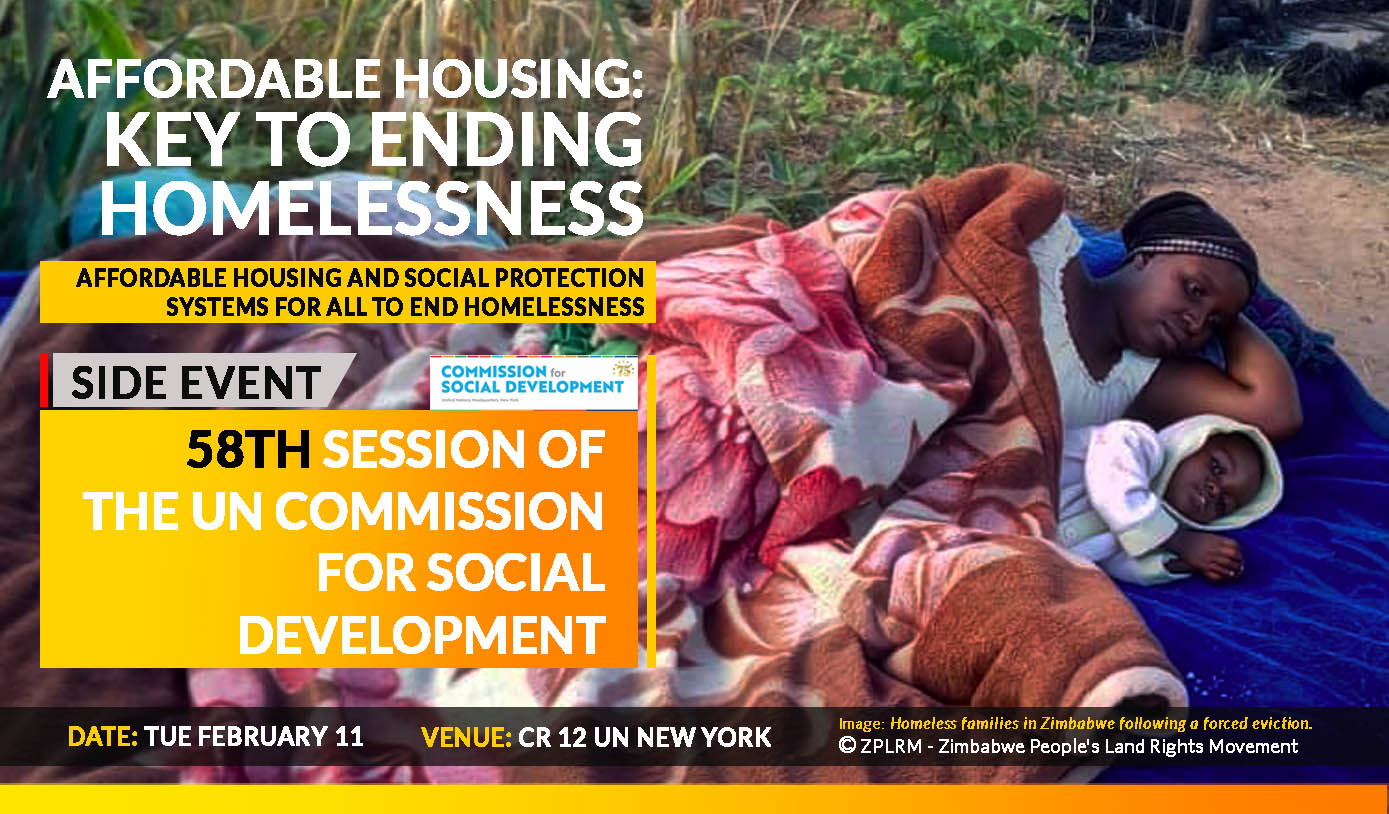The fifty-eighth session of the Commission for Social Development (CSocD58) will take place from 10 to 19 February 2020 in Conference Room 4, at the United Nations Headquarters in New York. The Commission is the advisory body responsible for the social development pillar of global development.
In 2020, we are celebrating the 75th anniversary of the Commission and the 25th anniversary of the Copenhagen Declaration on Social Development. 2020 is a crucial year for the accelerated realization of inclusive societies and reducing inequalities everywhere for people of all ages.
Priority Theme: Affordable housing and social protection systems for all to address homelessness
Homelessness is an egregious violation of human rights occurring in all countries, threatening the health and life of the most marginalized. Homelessness is the unacceptable result of States failing to implement the right to adequate housing. It requires urgent and immediate human rights responses by the international community and by all States.”
SIDE EVENT DESCRIPTION
Given the success of HIC’s side event during CSocD’s 57th Session, and given that the 58th Session’s priority is “Affordable housing and social protection systems for all to end homelessness,” HIC has proposed to continue its engagement with UNDESA to host a side event entitled: “Affordable Housing: Key to Ending Homelessness.” In doing so, HIC applies its Human Rights Habitat Observatory approach by aligning states’ permanent human rights obligations with their voluntary and temporal global policy commitments toward resolving habitat problems, challenges and dilemmas.
In doing so, HIC has designed a side event that follows a progressive course of three related sub-topics and two good-practice examples:
- Problem statement: Drivers of Homelessness (evictions, VaW, impoverishment, inequality, etc.)
- Human Rights Habitat Observatory approach
- Solutions: Housing Finance and Resource Mobilization to address homelessness:
– Example 1: Incremental Housing (factors for change and resources involved)
– Example 2: Social Production of Housing/Habitat (factors for change and resources involves). o Other examples from Asia, Africa, Latin America Europe and North America
This side event has been packed to examine the issue of homelessness in the context of remote and immediate causes as well as possible short and long term solutions. The side event will also be reviewing the drivers of Homelessness (evictions, violence against women, poverty, inequality, social exclusion, natural disasters, etc.) and will build on the outcomes of the fifty-seventh session of the Commission for Social Development that have discussed fiscal, wage and social protection policies to address inequalities and challenges to social inclusion.
Homelessness is a human right violation
The Universal Declaration of Human Rights recognizes, and the International Covenant on Economic, Social and Cultural Rights guarantees the human right to adequate housing for everyone. Binding human rights treaties and other instruments of international law define what states, including UN Members, are continuously obliged to do. The seven over-riding implementation principled enshrined in the Covenants specify how that is to be done; i.e., by practicing self-determination, nondiscrimination, gender equality, rule of law, progressive realization of the human rights, maximum of available resources, and international assistance and cooperation.
Authoritative legal interpretation defines housing “adequacy,” violations and states parties’ obligations, and the UN Treaty System monitors compliance and the promised “continuous improvement of living conditions.” In the Habitat II Agenda (1996), states repeatedly committed themselves to ensuring “the progressive realization of the human right to adequate housing.”
—
Homelessness and the global agendas
Additionally, the General Assembly resolution Transforming our World: The 2030 Sustainable Development Agenda (A/RES/70/1), the corresponding Sustainable Development Goals (SDGs), as well as the New Urban Agenda (NUA) commitments, set out the principles and specific measures to which states committed to achieve measurable progress within pour current timeframe.
SDG processes monitor progress against specific Targets and indicators such as:
The “Proportion of total adult population with secure tenure rights to land, with legally recognized documentation, and who perceive their rights to land as secure, by sex and by type of tenure(indicator 1.4.2),
Promoting development-oriented policies that support productive activities, decent job creation, entrepreneurship, creativity and innovation…, including through access to financial services(Target 8.3), tracking the “Proportion of informal employment in non‐agriculture employment, by sex(indicator 8.3.1); and
11.1 By 2030, ensure access for all to adequate, safe and affordable housing and basic services and upgrade slums” (Target 11.1), while. These efforts are verified by the “Proportion of urban population living in slums, informal settlements or inadequate housing”(indicator 11.1).
It is notable, however, that indicator 11.1.1 does not capture homelessness, and the SDG process dropped the commitment to “Support[ing] least developed countries, including through financial and technical assistance, in building sustainable and resilient buildings utilizing local materials (Target 11.c).
Nonetheless, the NUA does recognize homeless people (para. 22 and 31) and commitsstates “to stimulating the supply of a variety of adequate housing options that are safe, affordable and accessible…” and taking “positive measures to improve the living conditions of homeless people, with a view to facilitating their full participation in society, and to prevent and eliminate homelessness, as well as to combat and eliminate its criminalization” (paras. 33 and 108).
In the NUA, states say, on behalf of their various spheres of government, how they plan to do this:
31. We commit ourselves to promoting national, subnational and local housing policies that support the progressive realization of the right to adequate housing for all as a component of the right to an adequate standard of living, that address all forms of discrimination and violence and prevent arbitrary forced evictions and that focus on the needs of the homeless, persons in vulnerable situations, low-income groups and persons with disabilities, while enabling the participation and engagement of communities and relevant stakeholders in the planning and implementation of these policies, including supporting the social production of habitat, according to national legislation and standards.
In a further endorsement of state-supported social production, states say:
46. We commit ourselves to promoting the role of affordable and sustainable housing and housing finance, including social habitat production, in economic development…
—
Speakers / Organizations (TBC)
Participants
- Dr. Ify Ofong, Director of Women in Development and Environment (WorldWIDE Network: Nigeria)
- Mr. Alcides Andrade, Director of Instituto para la Cooperación y Autodesarrollo (ICADE, Honduras)
- Mr. Joseph Schechla, Coordinator of Housing and Land Rights Network (HLRN, Egypt)
- Mr. Alvaro Puertas, General Secretary of Habitat International Coalition (HIC, Spain)
Contributions in writing, video or participation online:
- Ms. Carme Gual, Director of Agència Catalana de Cooperació al Desenvolupament (ACCD, Spain)
- Ms. Silvia de los Ríos, Architect and urban planner (CIDAP, Peru)
- Ms. Shivani Chaudhry, Director of Housing an Land Rights Network (HLRN, India)Ify has also invited
—
i Summary of the report A/HRC/31/54 of the SRAH, available at:
https://www.ohchr.org/Documents/Issues/Housing/HomelessSummary_en.pdf
Full report available at:
https://documents-dds-ny.un.org/doc/UNDOC/GEN/G15/294/52/PDF/G1529452.pdf?OpenElement

